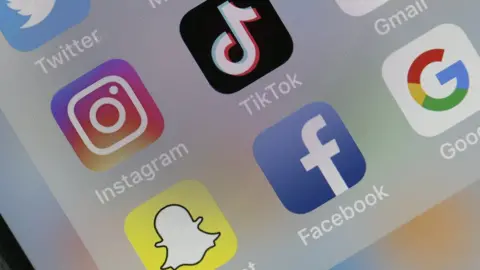Epilepsy charity calls for social media seizure warnings
 iStock
iStockA growing number of people with epilepsy have said they are having seizures triggered by flashing images on social media, a charity has warned.
The Epilepsy Society wants the government's new plans to tackle "online harms" to recommend warnings about flashing images on social media.
More than 18,000 people in the UK are thought to have epilepsy that can be triggered by photosensitivity.
The charity says cyber-bullies post malicious content intentionally.
The Epilepsy Society says anyone found guilty of posting harmful images intentionally should be prosecuted for assault.
The government said it would consult with the charity on the issue.
Facebook - which also owns Instagram - said it had "strict policies in place to help people who encounter abusive behaviour".
Unlike TV programmes, which are regulated by Ofcom, social media sites do not have to give a warning when potentially harmful flashing images are about to appear.
About 20,000 people in the UK have photosensitive epilepsy - where seizures are triggered by flashing lights or contrasting, fast-moving images, according to the Epilepsy Society.
The condition is most common in children and young people.
Epilepsy Society chief executive Clare Pelham said many Facebook and Instagram users shared videos with potentially dangerous content without realising the risk they posed.
"However, when it comes to deliberately targeting people with epilepsy with the intention of causing a seizure... we need to call that behaviour what it is - a pre-meditated and pre-planned intention to assault," she said.
"The government must bring this behaviour within the reach of the criminal law."
Malicious social media posts appear to have useful information about epilepsy on them, but have images embedded designed to provoke a seizure.
The posts are tagged with keywords around epilepsy to "deliberately target those with the condition", the Epilepsy Society said.

'Absolute minefield'
Sophie Harries, a 22-year-old dietitian from Somerset, was diagnosed with photosensitive epilepsy aged 15.
She said it used to be easier to avoid her seizure triggers, although she was not able to go clubbing, in case there was strobe lighting.
"That is still the case, but now I have to be careful of any videos uploaded to social media that contain strobe lighting or flashing imagery," she said.
"The videos tend to play automatically putting me at risk of a seizure. If my friends have been out clubbing I have to avoid social media for a while."
She recently reported a film trailer to Instagram that contained flashing lights, but it said the video did not breach its terms of usage, she said.
"You can un-follow posts but they still tend to follow you around."
Speaking to BBC Radio 4's Today programme, Ms Harries said she recently came across a video containing flashing images, which was tagged deliberately to the Epilepsy Society's Instagram page "in order to harm".
"For a 15-year-old today it is an absolute minefield. Young people are permanently on social media with friendship groups."

The Epilepsy Society has written to Digital Secretary Jeremy Wright asking for his reassurance that the new Online Harms paper will safeguard people with epilepsy.
A spokesperson for the Department for Digital, Culture, Media and Sport, said: "We will place a legally binding duty of care on companies towards their users, overseen by an independent regulator who will set clear safety standards.
"We are currently consulting on this, and want to hear from the Epilepsy Society, and others, about what steps they would like to see platforms take to make the internet a safer place."
A spokesperson for Facebook and Instagram told the BBC that "everyone deserves to enjoy the benefits of the internet safely", adding the organisations were exploring ways to make platforms "more inclusive".
